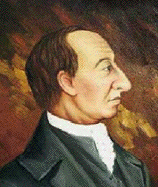June 3: Religion vs. Geology
James Hutton (1727):
Religion v. Geology
It was on this date, June 3, 1727, that Scottish geologist James Hutton was born in Edinburgh. He studied medicine there, completed his education in Paris, and took his degree at Leiden – but, there, being no employment for him at the time, he almost gave up science entirely for agriculture. But in studying the land he had inherited in Berwickshire, Hutton hit upon some geological ideas that he began to turn over in his mind: as he was turning over the soil: that one could trace the history of the earth through the mineralogy of the earth.
In 1785 Hutton submitted a paper to the newly established Royal Society of Edinburgh outlining his Theory of the Earth, capitulating his Investigation of the Laws Observable in the Composition, Dissolution and Restoration of Land upon the Globe. His idea pretty much invented the science of geology. He published a full-length Theory of the Earth in two volumes in 1795, anticipating through his observations of the geologic strata an idea of the evolution of the earth itself over vast stretches of time. This theory flew in the face of the Biblical teaching that the earth had been transformed only once, catastrophically, by a universal Flood.
The dogmatism of the Scottish Church was truly upset in 1794, however, when Hutton's wide-ranging intellect strayed into the realm of metaphysics. In An Investigation of the Principles of Knowledge, and of the Progress of Reason – from Sense to Science and Philosophy, Hutton developed his Deistic idea that there is no distinction between God and nature: "Here is, therefore, the wisdom of nature," wrote Hutton, "observed in those general laws of action and effect, by which the continual succession of things is ordered in Almighty power. Here is the general order of things, by which the common occurrences of life, or natural phenomena, are submitted to the understanding of man, or explained to the human intellect."
Since the beginning of the human race, but as dogma that could be resisted only at the peril of one's life, since the beginning of the Christian Era, the book of Genesis was the only acceptable book of geology: "all things were made at the beginning of the world." Before fundamentalist Islam clamped shut Muslim minds, Avicenna came up with a gradualist theory of the formation of the earth. French naturalist Georges Buffon was forced to recant when he taught a non-Biblical theory of the earth at the Sorbonne. But research into the age of rocks, the clerics thought, distracted the mind from the Rock of Ages – and led to infidelity and Atheism. Only with Hutton, and later with Darwin, was the truth of the scientific theory of gradualism gradually accepted.
Hutton was wrong about the age of the earth, and his idea that earth was created for the use of mankind strayed from the methodological naturalism that informs modern science, but his idea that the earth's surface was formed gradually rather than catastrophically is the view science holds to this day. And that is why we remember the man the Dictionary of National Biography calls "the first great British geologist."
Originally published June 2003 by Ronald Bruce Meyer.


